Publications of the ECSL NPOC Austria
Some of the works published by NPOC members can be found here.
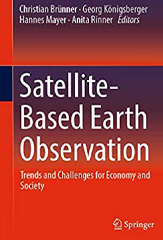
Satellite-Based Earth Observation: Trends and Challenges for Economy and Society
Christian Brünner (Hrsg.), Satellite-Based Earth Observation: Trends and Challenges for Economy and Society, Springer, 2018
The book focuses on the topic of trends and challenges with regard to satellite-based Earth observation. Contributors include legal experts in the field and representatives of institutions, such as the European Space Agency, the European Space Policy Institute, academia and the private sector.
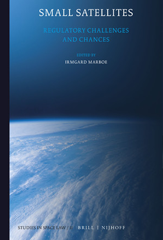
Small Satellites – Regulatory Challenges and Chances
Irmgard Marboe (Hrsg.), Small Satellites – Regulatory Challenges and Chances, Studies in Space Law 11, Brill/Martinus Nijhoff, 2016
The publication "Small Satellites – Regulatory Challenges and Chances" addresses the booming phenomenon of small satellites. The rapid innovation of technology has made it possible to develop, launch and operate small satellites at rather low cost. Universities, start-ups and also governments see the chance to access outer space more easily and inexpensively. Yet, the importance to comply with existing rules and regulations that are in place to ensure that outer space is used and explored in a safe and responsible manner is sometimes overlooked. The book addresses this challenge and shows how it can be met. The contributors are renowned academics and practitioners from many different countries that share their experiences and insights and suggest practical solutions.
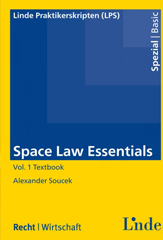
Space Law Essentials
Alexander Soucek, Space Law Essentials, Vol. 1, Linde, 2015
Anita Rinner/Hannes Mayer/ Yvonne Karimi-Schmidt/Christian Brünner, Vol. 2, Linde, 2015
Space Law Essentials (Vol. 1 Textbook & Vol. 2 Casebook) presents the theory and practice of space law in a modern, user-oriented format. The two volumes aim at introducing space law in a compact and comprehensible manner and at explaining the legal issues that may arise during the lifecycle of a space mission. They also include a collection of space law cases and show how space law and technology intertwine. The publication is addressed to law students and space practitioners alike.
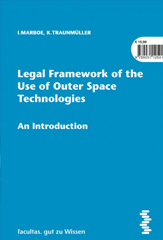
Legal Framework of the Use of Outer Space Technologies – An Introduction
Irmgard Marboe und Karin Traunmüller, Legal Framework of the Use of Outer Space Technologies – An Introduction, Facultas, 2013
This introduction to the legal framework of the use of outer space technologies evolved from material prepared for and used in the courses on space law at the Faculty of Law of the University of Vienna. The purpose of the present overview of legal sources and fields of application of space law is to provide a first insight into the legal issues connected to the exploration and use of outer space. After a brief overview over the historical development of space law, current challenges are discussed. These include the commercialisation and privatisation of space activities, the increasing number of space actors, the various ways and means of international cooperation, and the imminent problem of space debris.
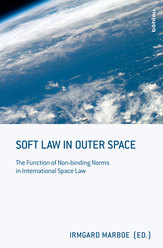
Soft Law in Outer Space
Irmgard Marboe (eds.), Soft Law in Outer Space – The Function of Non-binding Norms in International Space Law, Böhlau, 2012
The book consists of two main parts: Part I deals with general aspects of the role and function of soft law in international law and in international space law. It addresses issues such as the role of soft law for the formation of customary international law as well as with respect to international treaty law. Moreover, the role of non-state actors in the creation and application of soft law is also analysed. A further focus lies on the interaction of soft law and national law.
Part II is dedicated to specific non-binding international instruments concerning space activities. Several instruments are analysed in view of their regulatory effect with respect to the conduct of States and private actors. These instruments include UN General Assembly resolutions (e.g. on direct broadcasting, remote sensing and registration practice), guidelines (e.g. the UNCOPUOS Space Debris Mitigation Guidelines), codes of conduct (e.g. the European Code of Conduct on Outer Space Activities) and frameworks (e.g. the Safety Framework for Nuclear Power Sources). The general aspects addressed in Part I are taken up and reflected in the analysis of the specific instruments in Part II.
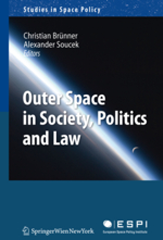
Outer Space in Society, Politics and Law
Christian Brünner, Alexander Soucek (eds.), Outer Space in Society, Politics and Law, Springer, 2011
The book offers a comprehensive approach to the exploration and use of outer space from a wide range of perspectives.
Contributors from different countries address historical, cultural, technical, economic, political and legal aspects of space activities and thereby underline the impact space and spaceflight have on society. Through this encompassing approach, the book reveals interrelationships and interactions between the different disciplines and actors. Thus, it also becomes understandable that space law may not be seen isolated from other spheres of society.
The practice-oriented and interdisciplinary approach makes the book indispensable for every reader interested in space law.
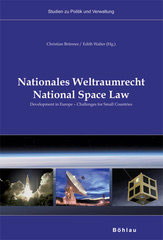
Nationales Weltraumrecht – National Space Legislation
Christian Brünner, Edith Walter (eds.), Nationales Weltraumrecht – National Space Law, Böhlau, 2008
The book gives an overview of the topic of national space legislation, its need, its problems and recent developments. Chapters include "The necessities for the development of national space law", "The state of the art and recent trends in the development of national space law", "National space laws in selected countries", and "National space law: the perspective of ESA European Cooperating States (PECS)". The last and final chapter "National space law: a challenge for Austria?" summarises the discussions and conclusions made during the conference "National Space Law: Development in Europe – Challenges for Small Countries", which was organised at the University of Graz in 2006.
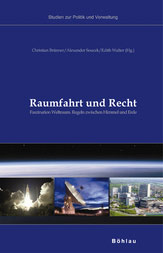
Raumfahrt und Recht – Faszination Weltraum – Regeln zwischen Himmel und Erde
Christian Brünner, Alexander Soucek, Edith Walter (eds.), Raumfahrt und Recht – Faszination Weltraum – Regeln zwischen Himmel und Erde, Böhlau 2007
Outer space has strategically and operationally become one of the most significant areas of human, social and political activity. At the symposium "Outer Space and the Law" at the University of Graz, experts from space research, law and politics discussed the many aspects of this fascinating area. The speakers at the symposium have compiled their presentations in written form in this book, in which they explain the basics of outer space activities in both technical and legal terms.
